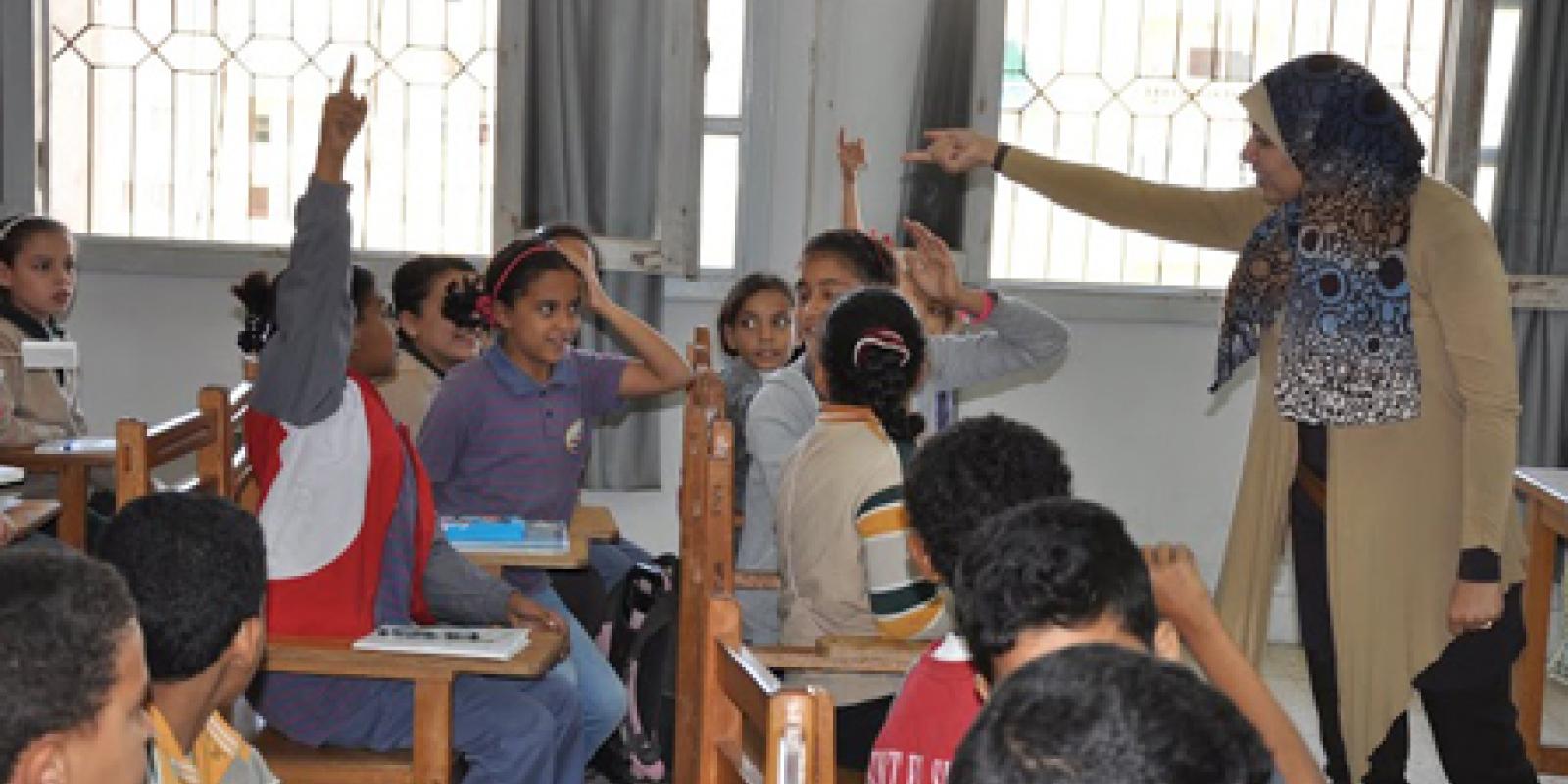
EduCamp Project Integrates Sustainability in Egyptian Public Schools
Ending a three-year pilot project to introduce sustainability concepts in Egyptian public schools, AUC’s Center for Sustainable Development (CSD), in cooperation with the Education for Sustainable Development Beyond the Campus (EduCamp) consortium, handed over Education for Sustainable Development (ESD) school kits to the Ministry of Education for implementation in public schools across the country.
“The EduCamp program integrates sustainable development into public school curricula in the form of debates, games, activities, experiments, group discussions and interviews,” said Hani Sewilam, director of AUC’s Center for Sustainable Development and professor of sustainable development and water resource management at the University, who led the EduCamp consortium. “We developed ESD kits for teachers to help them implement the curriculum, and we have received many requests from other teachers who would like copies of the kits.”
The pilot implementation phase was implemented in seven public schools in six governorates, with the schools twinning with partner universities in these governorates (AUC, Cairo, Alexandria, Fayyoum, Suez Canal, Zagazig and Heliopolis universities), in addition to the establishment of seven centers of excellence in sustainability education. Nearly 200 teachers were trained on integrating sustainable development techniques into their daily teaching routine. The project, which began in 2010, also involved analyzing public school textbooks in terms of content on sustainability. Sewilam and his team conducted interviews and presented questionnaires to teachers, students and administrators in order to gauge their level of awareness on sustainable development concepts. Most importantly, the survey revealed that students were eager to participate in hands-on learning activities and not be limited by theoretical learning styles and memorization for exams. As a result, Sewilam and his team proposed and developed 250 student-focused learning activities for a wide variety of subjects.
The kits target children in grades five through nine and cover a comprehensive range of sustainability issues including water, agriculture, biodiversity and energy. The kits also utilize low-cost materials and are designed to be easily integrated into the curricula. “The kits,” Sewilam explained, “prepare and enable school instructors to teach their students about the importance of integrating sustainable practices in their lives and broader environments.”
Emphasizing the ease of integrating the sustainability kids into current school curricula, Mohamed Anwar, a teacher at Sekem private school in Sharqiya governorate and one of the project trainers, told Al Youm Al Sabie, “The activities are fun and enjoyable for the students and, at the same time, serve an educational purpose. This type of participatory engagement will help teachers across all subjects –– science, social studies, math and English –– and will leave a lasting impression on the students, since it does not just involve lecturing in class. The students are happy with it, and the project is easily applicable at any school.”
Echoing the same sentiment, Abdel Hamid Al Zohairy, president of Heliopolis University, said in an interview on ONTV, “For the project to be effective, it should be part of a long-term ministerial plan to change traditional methods of instruction and increase student-teacher interaction. The project is based on simulation and comprehension, not memorization; that’s why it’s successful.”
In addition to promoting sustainable development education in Egyptian public schools, the project is now reaching out to students in informal settlements. As a preliminary trial, CSD graduate students helped train teachers and conducted educational activities with students in Establ Antar, an underprivileged neighborhood in Old Cairo, utilizing the kits. The students worked alongside the Sohbet El Kheir Association, which runs a community center and school in the neighborhood. After assessing what the most pressing sustainability issues in the community are, the CSD team then targeted those areas specifically by using the relevant school kits.
The positive responses by students and teachers in the area prompted the CSD to pursue further EduCamp offshoots in other informal areas. “We are now shortlisted for new project funding from the German International Cooperation (GIZ), which could help us realize our current goals,” said Sewilam. “We are planning on adapting the EduCamp school kits to the local community in El Warraq informal area, as well as improving educational and recreational services there through the development of a six-week summer enrichment program. We plan to make use of the available schooling programs and qualified trainers to build the capacities of children and youth, who will then go on to contribute positively in solving many of the problems in the area including poor quality education, shortage of electricity and natural gas, poor water quality, garbage and solid waste disposal, and lack of awareness about health services.”
Emphasizing the importance of this initiative, Sewilam affirmed, “Close observation of Egypt’s resource use trends tells us that we are moving toward some form of unsustainable development rather than steadily progressing toward sustainability. To rectify that, we must address Egypt’s future generations and reinforce the notion that protecting the environment is crucial for us, as humans, to thrive.”
To view a photo gallery of EduCamp projects,click here.
For more information about EduCamp,click here.
